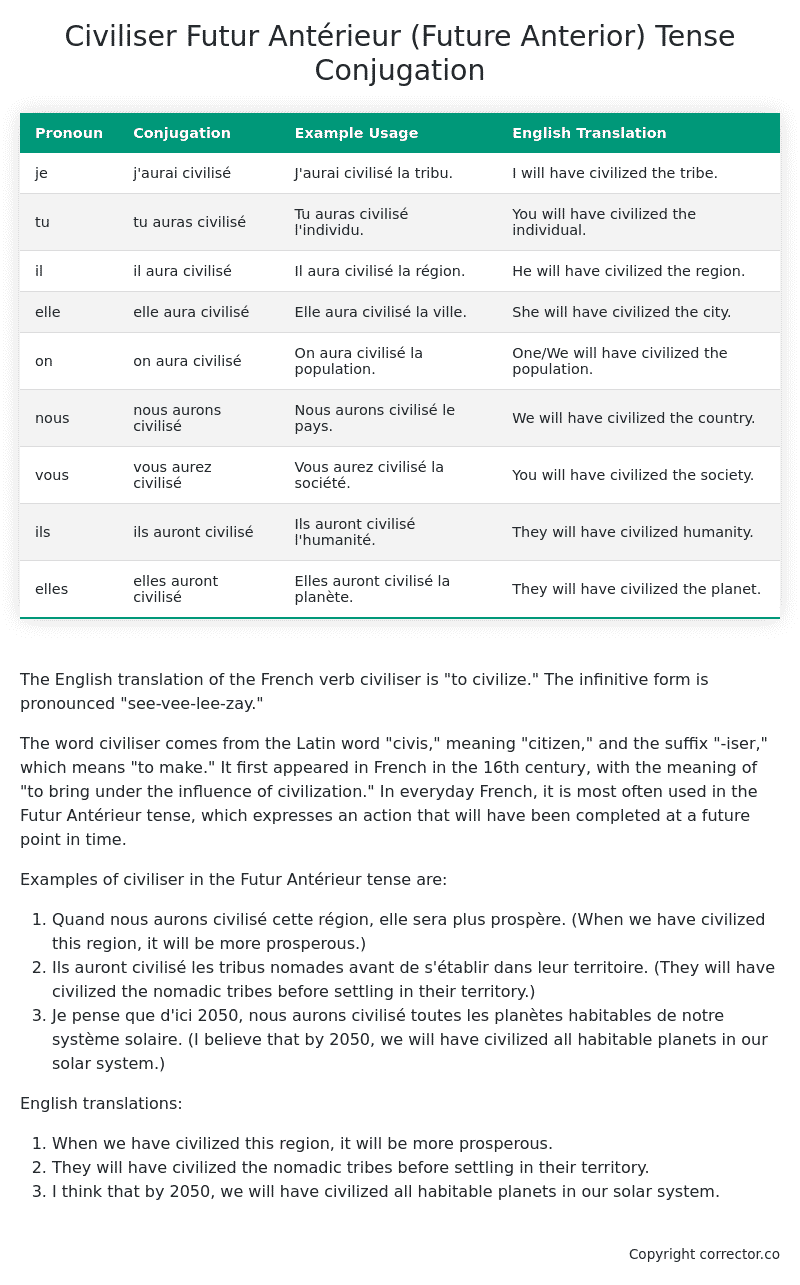Futur Antérieur (Future Anterior) Tense Conjugation of the French Verb civiliser
Introduction to the verb civiliser
The English translation of the French verb civiliser is “to civilize.” The infinitive form is pronounced “see-vee-lee-zay.”
The word civiliser comes from the Latin word “civis,” meaning “citizen,” and the suffix “-iser,” which means “to make.” It first appeared in French in the 16th century, with the meaning of “to bring under the influence of civilization.” In everyday French, it is most often used in the Futur Antérieur tense, which expresses an action that will have been completed at a future point in time.
Examples of civiliser in the Futur Antérieur tense are:
- Quand nous aurons civilisé cette région, elle sera plus prospère. (When we have civilized this region, it will be more prosperous.)
- Ils auront civilisé les tribus nomades avant de s’établir dans leur territoire. (They will have civilized the nomadic tribes before settling in their territory.)
- Je pense que d’ici 2050, nous aurons civilisé toutes les planètes habitables de notre système solaire. (I believe that by 2050, we will have civilized all habitable planets in our solar system.)
English translations:
- When we have civilized this region, it will be more prosperous.
- They will have civilized the nomadic tribes before settling in their territory.
- I think that by 2050, we will have civilized all habitable planets in our solar system.
Table of the Futur Antérieur (Future Anterior) Tense Conjugation of civiliser
| Pronoun | Conjugation | Example Usage | English Translation |
|---|---|---|---|
| je | j’aurai civilisé | J’aurai civilisé la tribu. | I will have civilized the tribe. |
| tu | tu auras civilisé | Tu auras civilisé l’individu. | You will have civilized the individual. |
| il | il aura civilisé | Il aura civilisé la région. | He will have civilized the region. |
| elle | elle aura civilisé | Elle aura civilisé la ville. | She will have civilized the city. |
| on | on aura civilisé | On aura civilisé la population. | One/We will have civilized the population. |
| nous | nous aurons civilisé | Nous aurons civilisé le pays. | We will have civilized the country. |
| vous | vous aurez civilisé | Vous aurez civilisé la société. | You will have civilized the society. |
| ils | ils auront civilisé | Ils auront civilisé l’humanité. | They will have civilized humanity. |
| elles | elles auront civilisé | Elles auront civilisé la planète. | They will have civilized the planet. |
Other Conjugations for Civiliser.
Le Present (Present Tense) Conjugation of the French Verb civiliser
Imparfait (Imperfect) Tense Conjugation of the French Verb civiliser
Passé Simple (Simple Past) Tense Conjugation of the French Verb civiliser
Passé Composé (Present Perfect) Tense Conjugation of the French Verb civiliser
Futur Simple (Simple Future) Tense Conjugation of the French Verb civiliser
Futur Proche (Near Future) Tense Conjugation of the French Verb civiliser
Plus-que-parfait (Pluperfect) Tense Conjugation of the French Verb civiliser
Passé Antérieur (Past Anterior) Tense Conjugation of the French Verb civiliser
Futur Antérieur (Future Anterior) Tense Conjugation of the French Verb civiliser (this article)
Subjonctif Présent (Subjunctive Present) Tense Conjugation of the French Verb civiliser
Subjonctif Passé (Subjunctive Past) Tense Conjugation of the French Verb civiliser
Subjonctif Imparfait (Subjunctive Imperfect) Tense Conjugation of the French Verb civiliser
Subjonctif Plus-que-parfait (Subjunctive Pluperfect) Tense Conjugation of the French Verb civiliser
Conditionnel Présent (Conditional Present) Tense Conjugation of the French Verb civiliser
Conditionnel Passé (Conditional Past) Tense Conjugation of the French Verb civiliser
L’impératif Présent (Imperative Present) Tense Conjugation of the French Verb civiliser
L’infinitif Présent (Infinitive Present) Tense Conjugation of the French Verb civiliser
Struggling with French verbs or the language in general? Why not use our free French Grammar Checker – no registration required!
Get a FREE Download Study Sheet of this Conjugation 🔥
Simply right click the image below, click “save image” and get your free reference for the civiliser Futur Antérieur tense conjugation!

Civiliser – About the French Futur Antérieur (Future Anterior) Tense
Construction
Common Everyday Usage Patterns
Interactions with Other Tenses
For example
Summary
I hope you enjoyed this article on the verb civiliser. Still in a learning mood? Check out another TOTALLY random French verb conjugation!


